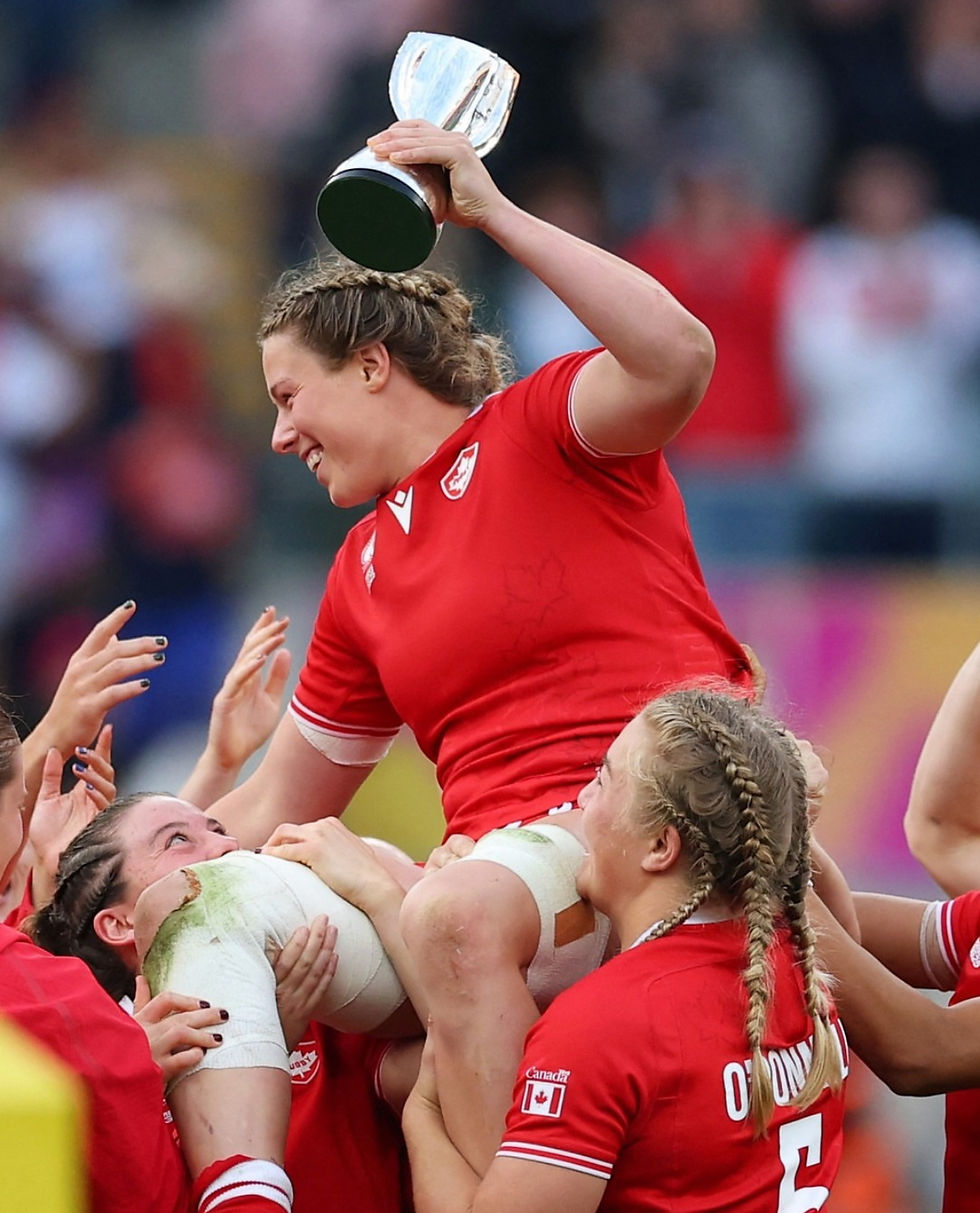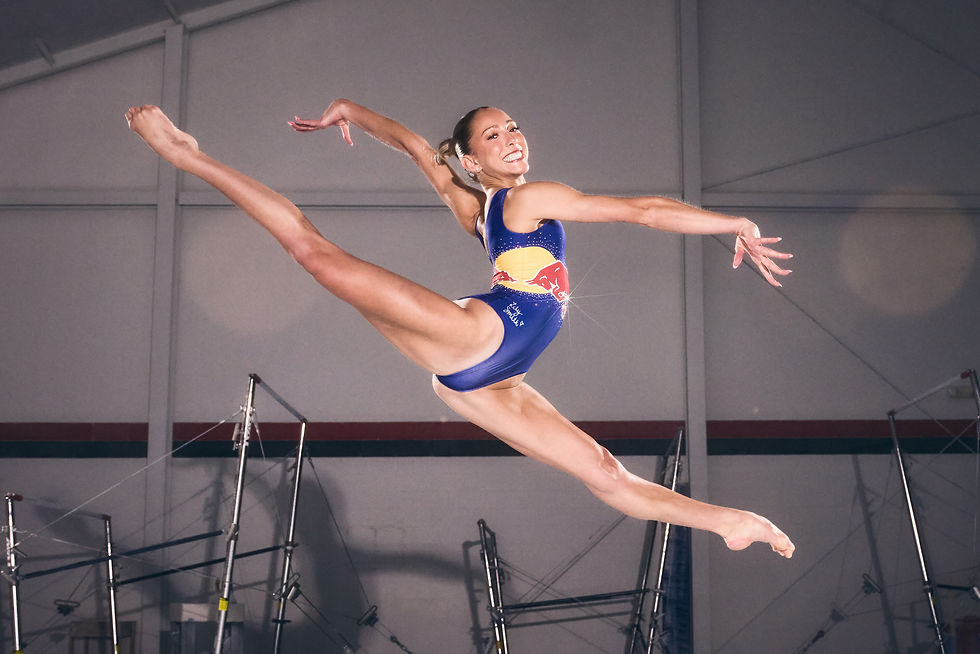"Be-Leaf, Belief": Team Canada's Incredible World Cup Story
- Karinna Leonard
- Sep 29, 2025
- 5 min read
This year, Ilona Maher isn't the only rugby player that's getting attention. Under the bright lights of the Women's Rugby World Cup, Team Canada showed the world exactly why they remain a powerhouse in the sport. From August 22nd to September 27th, 16 nations battled in England for a chance to win the championship title at the 10th edition of the Women's Rugby World Cup. Much like the Olympics, this is a quadrennial tournament—played only once every four years. This makes each appearance a momentous and defining one. Without the backing of their nation, Team Canada would have missed out on this rare opportunity to dominate on the global stage.

When planning for the tournament began, Rugby Canada decided they would only be pledging $2.6 million towards the team, leaving them nearly $1 million short of the necessary funds. In response, Team Canada and Rugby Canada launched the "Mission: Win World Cup 2025" fundraising campaign, calling on the public to help close their funding gap. The players never let this giant roadblock stand in their way. On the eve of the tournament, they announced they had reached 95% of their fundraising goal. They carried that momentum into the World Cup with the tagline "Be-Leaf, Belief." After a shocking semi-final victory over the reigning world champion New Zealand squad, Sophie De Goede—the heart and soul of Team Canada—reflected on what the slogan truly meant: "It runs so deep. We’ve defied the odds over and over again and that has a way of bringing you together and a way of propelling you forward …of fostering that knowledge within the group that we can overcome anything." As Sophie mentioned, the team's journey isn't just about rugby. It is a story of resilience and a deep belief in the growth of women’s sports in Canada.
Team Canada automatically qualified for the 2025 World Cup by reaching the semi-final in the 2021 World Cup. They have never finished lower than sixth place at the tournament; however, this was only their second appearance in the final. Their previous final appearance was in 2014, when they lost to England—making this year's clash a long-awaited rematch. Despite their resilience and relentless determination, Canada ultimately faced heartbreak as England once again proved to be the hurdle they could not overcome. The Maple Leafs left with silver medals, but far from defeated spirits. Their belief and courage ensure they'll be back chasing gold again soon.

Heading into the World Cup, Team Canada was ranked second in the world, but their circumstances made them appear like underdogs. Beyond having to raise funds to attend the tournament, the players make little money from international play. England's squad has the advantage of signing a contract with the Rugby Football Union, which adds a significant bonus on top of their club wages. In comparison, Rugby Canada CEO Nathan Bombrys has said that even if the Canadians did every tournament in this calendar year, they would only make $12,000. Additionally, most of the Canadian women have to move overseas to either England or France to play club rugby, where they earn little more than room and board. If they are not playing abroad, those who live in North America often have to work day jobs around their rugby careers. For example, Olivia DeMerchant is both a forward for Canada and a firefighter for the Halifax Fire Department. Balancing elite training with the financial instabilities of their sport is a clear disadvantage, but one that highlights the team's resiliency.

Their story reflects a larger reality across women's rugby. Even at the World Cup level, structural disparities remain between the women's and men's games. For example, the women's roster is capped at 32 players, while each men's team gets an additional roster spot. For those unfamiliar with the sport, rugby is primarily played in two forms: 7s and 15s. The World Cup features the traditional version where each side fields 15 players for two 40-minute halves. The 15s game is a grueling test of endurance and strategy, which is exactly why coaches argue that women deserve the same 33-player roster allotment as their male counterparts. Rugby is an intense sport, and its physical demands make it critical to have a full, healthy squad. With the World Cup stretching over a month with 30 total matches, having even just one more player could ease the strain of injuries and fatigue.

Amid these disparities, this year's World Cup also marked important progress. For the first time in Rugby World Cup history, the tournament featured an all-female team of referees with 22 officials from 12 unions around the world. This milestone reflects how the growth of women's rugby is extending beyond the field to every corner of the sport. The final match added another landmark, drawing a record-breaking crowd of 81,885 to Twickenham Stadium to watch England's Red Roses face Canada's Maple Leafs. Canada has helped fuel that growth by believing in their national team and investing in its success, pushing the game forward and giving women the opportunity to keep playing the sport they love.

On their quest to lift the cup, Canada dominated pool play, beating Fiji (65-7), Wales (42-0), and Scotland (40-19). In the knockout stage, they beat Australia (46-5) before passing a true test against New Zealand (34-19). With six World Cup championship titles, New Zealand seemed unbeatable, but Canada didn't let this stand in their way. Asia Hogan-Rochester credited their success to their ability to stick to their game plan, saying the message at half-time was to "Keep it Canadian...That basically means just continuing to be brave, continuing to play with the flair that we have, and sticking to our plan." That spirit carried them into the final. Despite their brilliance, they ultimately fell short, losing 33-13. The Canadians lamented the loss but remained proud of their growth. Vice-captain Sophie de Goede reflected on this in her post-game interview: "If you look at the scope of things, we've created a lot of momentum for the sport back home, and that was one of our major goals. It's not the celebration that we hoped to be having tonight, but it's still something we can celebrate." Her message was clear: despite the loss, fans of Team Canada and rugby everywhere should be proud of the momentum that they have created in women's rugby.
Throughout the tournament, Sophie de Goede was a key pillar of success for Canada. The 26-year-old from Victoria plays as the number 8 forward and exemplifies the team's resilience and passion. She had a remarkable tournament after only returning to action in July, having been sidelined for 13 months recovering from a torn ACL, and was announced as a finalist for World Rugby’s Women’s Player of the Year. Following the final match, Sophie was crowned the winner of the award. She credited her success to her teammates and looked ahead to their future, saying, "It's just a privilege for me to get to play with these women and I look forward to continue doing that." Her comeback and standout performance mirror Canada's resilience and belief in their ability to grow.

Sophie de Goede's return perfectly reflects Team Canada's journey throughout the World Cup. Their unwavering commitment and belief allowed them to not only overcome challenges but also to dominate on the field. The "Be-leaf, Belief" slogan captures the power of their story by showing that belief can drive real progress when combined with trust in one's team.
Edited by: Kelly Cassette




Comments